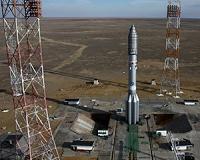 |
Sydney, Australia (SPX) Apr 07, 2011 Sending astronauts to Mars has been the ultimate objective of human spaceflight. But it's always been elusive. We started the space age with the knowledge that it would require a lot of preparation, and it would probably take decades to achieve. Decades have passed, and we're still a long way from achieving this goal. Sometimes, it seems that we're moving backwards instead of slowly forwards. Nobody has walked on the Moon in almost 40 years, and soon, NASA will not even be able to independently launch astronauts into Earth orbit. In times like these, is it really possible to dream of flying to Mars? It may still be a dream, but it's closer to reality than many people may think. We are getting closer to Mars every year, in ways that even people inside the space community don't always notice. For a start, let's not forget that the world is still in the spaceflight business. Things are tough right now, mostly for economic reasons, but we are still going. Human and robotic spaceflight will continue to be a reality in the decades ahead. There is momentum to keep it going for mundane, practical reasons, as well as the loftier goals of reaching into the unknown. Our basest survival instincts and higher aspirations will continue to sustain spaceflight. This ensures that the basic infrastructure of a space industry and a spaceflight community will always be in place. It will be this basis that serves as the root for a human Mars program. We're learning a lot more about our destination, too. Successive waves of robotic Mars missions are mostly aimed at uncovering the scientific mysteries of the planet. They're answering a lot of deep questions, but they're also serving a reconnaissance function. We know the terrain. We know what to expect when we get there. This helps us to prepare for the challenges that will confront astronauts who step onto the surface. We're also learning a lot more about ourselves. We know how to keep humans alive and well in space for long periods. We're increasing our understanding of how the space environment affects the human body. The International Space Station is a big part of this picture, both by hosting astronauts and performing biomedical research in its laboratory facilities. On Earth, biomedical research is furthering our understanding of radiation, immunosuppression, and other challenges to space travellers. Operating a large, complex space station for a long period also gives us practical experience when things go wrong. We know what can fail, and how to deal with it. Sometimes the solutions are choreographed. Sometimes they're made up on the spot. This sort of experience can't come from simulations. We have also had some breakthroughs in key areas such as propulsion. Mars visionaries are gravitating toward a new generation of mission architectures that get astronauts to Mars quickly. Doing so helps to avoid a lot of the problems that would develop on long, multi-year missions. Ideas such as the VASIMIR propulsion system, which holds the potential for a fast ride, are gaining ground. The resurrection of a small NASA office for generating out-of-the-box thinking will also help to generate new ideas. Then there's generic research into science and engineering. Many boffins are already helping us to get to Mars without even realizing it. They are developing better mechanical components, materials, electronics and other components that will probably find their way aboard a Marsbound spacecraft. There's one barrier that will be harder to overcome. Going to Mars will be expensive, even with the most advanced technology. It will take a long time before the world is financially healthy enough to support such a mission. But we need time to hone our skills and lay the groundwork. Basic research and development in spaceflight can serve many purposes. It helps us here and now, by supporting our near- term objectives in space. It also helps to build a foundation for going further. Furthermore, a "one brick at a time" approach will help to defray the cost. By the time we are ready to propose a Mars mission, most of the infrastructure and development should already be in place. It's difficult to guess how long it will take us to get there. In the 1960s, most space pundits agreed that there would be footprints on Mars by the turn of the century. This didn't happen, and we will probably need to wait another 20 years for the mission. It could even take longer than that, if the world is struck by major catastrophes. But it's a long quest, and we shouldn't forget how far we have already come. Every step brings us closer to our destination. Dr Morris Jones is an Australian space analyst and writer. Email morrisjonesNOSPAMhotmail.com. Replace NOSPAM with @ to send email.
Share This Article With Planet Earth
Related Links - Space Analysis and Space OpEds
 The Benefits Of Space Exploration
The Benefits Of Space ExplorationMoscow, Russia (RIA Novosti) Apr 07, 2011 The dawning of the space age opened our eyes to the universe and the planet we inhabit, and the ability of humankind to venture beyond Earth's atmosphere triggered a revolution in science - on this there was no disagreement among the Russian scientists interviewed by RIA Novosti in the run-up to the 50th anniversary of the first manned space flight. However, many of the scientists expresse ... read more |
|
| The content herein, unless otherwise known to be public domain, are Copyright 1995-2010 - SpaceDaily. AFP and UPI Wire Stories are copyright Agence France-Presse and United Press International. ESA Portal Reports are copyright European Space Agency. All NASA sourced material is public domain. Additional copyrights may apply in whole or part to other bona fide parties. Advertising does not imply endorsement,agreement or approval of any opinions, statements or information provided by SpaceDaily on any Web page published or hosted by SpaceDaily. Privacy Statement |